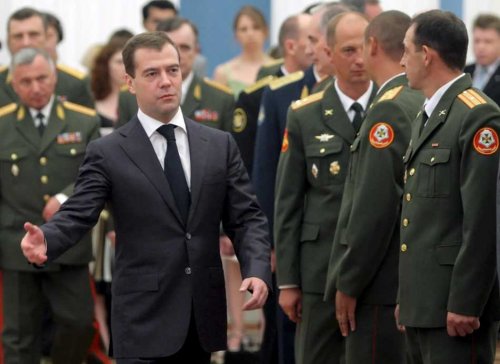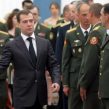
Medvedev Plays Anti-Western Card to Promote Military Reform
Publication: Eurasia Daily Monitor Volume: 6 Issue: 56
By:

On March 17 Russia’s President Dmitry Medvedev addressed a session of the Ministry of Defense board in order to outline a large-scale rearmament program which will commence in 2011, designed to give the Russian armed forces a "new look" Medvedev used the occasion to pointedly restate the military reform and modernization agenda first detailed by Defense Minister Anatoliy Serdyukov in October 2008. In substance there was little new in this latest address, but the tone and rhetoric contained elements of justifying the radical reform plans in reference to the United States and NATO clearly cast as threats to Russia and its national interests.
Medvedev delineated several factors underlying the need to re-equip and modernize Russia’s armed forces, including the continued efforts of NATO to expand towards Russia’s borders with future membership for Georgia and Ukraine: "Any analysis of the military and political situation in the world shows that in a number of regions serious potential for conflict remains. There is always the risk of local crises and international terrorism. Attempts to expand the North Atlantic Treaty Organisation on the borders of our country continue. All this requires a qualitative modernization of our Armed Forces to give them a new, forward-looking perspective. Despite the current financial difficulties, we can make all the necessary provisions" (www.kremlin.ru, March 17).
Russia’s new National Security Strategy to 2020, which will be ratified shortly, will describe these threats to Russia’s national interests more precisely, as well as giving shape to the aims and scope of the military reform process now underway, before being further elaborated in its new military doctrine later this year. The cumbersome task of explaining the U.S. and NATO linkage to this recalibration of the Russian military was delegated to Defense Minister Serdyukov, who was unequivocal in his attack on American foreign policy: "The military-political situation was conditioned by the U.S. administration’s ambition to attain global leadership, by the expansion and build-up of the military presence of the United States and their NATO allies in regions neighbouring on Russia. The U.S. side’s aspirations were aimed at getting access to the natural, energy and other resources of CIS countries. Processes aimed to squeeze Russia out of the area of its traditional interests were given active support" (www.mil.ru, March 17).
American aspirations for "global leadership," coupled with the presence of the U.S. military close to Russia in areas which the regime regards as zones of "special strategic influence" along with Washington’s alleged efforts to compete with Moscow for access to strategic energy assets, were identified as critical factors underpinning the need to modernize Russia’s military. Only after this, in terms of priority, did Serdyukov mention threats to the state emanating from international terrorism, religious extremism, or weapons proliferation. Finally, he again linked the reform program to the failings exposed by the conflict in Georgia in August 2008: "Georgia’s attack on South Ossetia became a direct threat to the Russian Federation’s national interests and military security. That attempt to resolve a conflict through the use of force was aimed primarily to destabilize the situation in the Caucasus," Serdyukov asserted (Zvezda TV, March 17).
In both speeches, there was little to distinguish Medvedev or Serdyukov’s views of the reform process which were initiated following the Russia-Georgia war. The first priority is to modernize and maintain the strategic nuclear forces, and this remains vital. In its conventional structures the military will transfer to permanent readiness, downsize from 1.3 million servicemen to one million, shed 200,000 officer posts to enhance command and control efficiency, move to a brigade based structure capable of rapid deployment in a crisis, introduce new weapons and equipment throughout the forces (30 percent by 2015 and 70 percent by 2020), streamline the system of military education and enhance social conditions for personnel (Interfax, March 17).
Serdyukov explained that priority tasks have been set for 2009, ranging from transferring units and formations to permanent readiness to increasing the number of military exercises. Later this year joint exercises will be staged between Belarus and Russia, "Zapad 2009" which may involve rehearsing repelling NATO intervention in Belarus: assuaging the Russian generals that cling desperately to old ideas of Western threats to Russia. In September 2009 Kazakhstan will host the first military exercise of the new CSTO rapid Reaction Forces, which Serdyukov said will be equipped with modern weaponry, equipment and specially designed uniforms (www.mil.ru, March, 17).
Despite recourse to anti-western rhetoric, perhaps also timed to coincide with preparing the ground for Medvedev’s first meeting with President Obama in London at the G20 summit in April, the military transformation underway in Russia marks a genuine departure from any pretence that its conventional forces take seriously a "threat" from the West. Abolishing the mass mobilization concept, preferring instead to form permanent readiness units more suited to intervention in regional or local conflicts, and redistributing Russia’s airborne forces traditionally based west of the Urals, basing future airborne brigades in each of the country’s six military districts contradicts the rhetoric. Medvedev and Serdyukov have adopted the language of decrying the West for mainly domestic reasons, to sell the reform to unconvinced generals that barely understand why and how these changes will be introduced.
Medvedev’s appearance at the MoD resulted from several factors. He addressed generals and admirals concerned about the changing shape and structure of the armed forces and planned drastic cuts in the size of the Russian officer corps. This was also intended to reassure internal critics of reform that despite Russia’s experience of the financial crisis such an agenda can and will be implemented, even if it takes longer than first intended. Medvedev’s appeal to his audience that such reforms are needed based on the threat of NATO expansion was calculated to increase support within the military for the controversial agenda. Finally, by remoulding military modernization as a response to a "Western" threat, Medvedev was also appealing for greater public support for military reform. As the reforms proceed, the anti-western rhetoric will fluctuate depending on how successfully these changes can be made.




